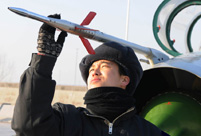 Int'l Snow Sculpture Art Expo in Harbin
Int'l Snow Sculpture Art Expo in Harbin Sichuan money wall for dividend payment
Sichuan money wall for dividend payment Li Na crashes Belinda Bencic in 2nd round at Australian Open
Li Na crashes Belinda Bencic in 2nd round at Australian Open
 Shocking moments when PLA's weapons open fire
Shocking moments when PLA's weapons open fire Famous Lanzhou beef noodles
Famous Lanzhou beef noodles Armed Police hold anti-terrorism drill in SE China's Xiamen
Armed Police hold anti-terrorism drill in SE China's Xiamen Harbin Int'l Ice and Snow Festival opens
Harbin Int'l Ice and Snow Festival opens 'Jin' named the word of the year by cross-strait netizens
'Jin' named the word of the year by cross-strait netizens Chinese scientific expedition goes to build new Antarctica station
Chinese scientific expedition goes to build new Antarctica station
BEIJING, Jan. 21 -- Annual "two sessions" -- meetings of local legislatures and local political advisors -- kicked off in January across China.
Despite differences of economic and social situations from province to province, many local legislative sessions have topics in common.
Many local governments have lowered GDP goals for 2014 in pursuit of more balanced development. In days gone by it was all about GDP.
Shanghai Mayor Yang Xiong declared that in 2013, the city's GDP was expected to grow by 7.7 percent and fiscal revenue by 9.8 percent. In 2014, Shanghai plans to raise GDP by 7.5 percent and keep fiscal revenue increasing in step with economic growth.
Similarly, Liu Weiping, governor of Gansu in the northwest, also reduced GDP expectations from 12.1 percent growth in 2013 to 11 percent in 2014. Hebei and Fujian lowered growth goals by 0.5 percent.
According to central economic and urbanization work conferences last year, China plans steady, proactive forward progress in human-centered urbanization for 2014.
Urbanization through new construction work is the chosen route toward modernization, and is seen as offering a solution to rural problems. Gansu Province, for example will press on with development of the Silk Road economic belt.
Many local government reports reiterate the importance of quality urbanization and its potential to increase domestic demand, raise productivity and end the urban-rural duality.
Fighting smog also appears near the top many of the government reports, much as in 2013, more than 100 big and medium cities in 25 regions were affected by smog. According to a five-year plan on air pollution, China will cut coal use, shut down polluters, promote cleaner production and cut the density of inhalable particulate matter.
In recent government reports, the environment was given much more weight in assessing official performance.
At Beijing's People's Congress, Mayor Wang Anshun declared an "all-out effort" to cut coal use by 2.6 million tons and transform 300 polluting companies this year.
North China's Hebei Province, one of the most polluted, is trying to cut steel and cement production capacities by 60 million tons each year by 2017, striving for a better environment.
 Su-30 fighter formation taking off for training
Su-30 fighter formation taking off for training  Xuelong carries on mission after breaking from floes
Xuelong carries on mission after breaking from floes Charity exhibition raises money for panda protection
Charity exhibition raises money for panda protection 'Map of China' on the stone
'Map of China' on the stone  Chinese naval escort taskforce repels 4 suspicious vessels
Chinese naval escort taskforce repels 4 suspicious vessels World's weekly photos (1.6-1.12)
World's weekly photos (1.6-1.12) Li Na crashes Belinda Bencic in 2nd round at Australian Open
Li Na crashes Belinda Bencic in 2nd round at Australian Open Weekly sports photos
Weekly sports photos China's national pole dancing to play 'The Butterfly Love'
China's national pole dancing to play 'The Butterfly Love'  The never-ending Silk Road
The never-ending Silk Road  Spring Festival travel rush: One window, one world
Spring Festival travel rush: One window, one world Int'l Snow Sculpture Art Expo in Harbin
Int'l Snow Sculpture Art Expo in Harbin China photographs internal structure of water molecule
China photographs internal structure of water molecule 'Predator' makes proposal to girlfriend
'Predator' makes proposal to girlfriend Thousands of fish frozen on Norway sea
Thousands of fish frozen on Norway seaDay|Week|Month